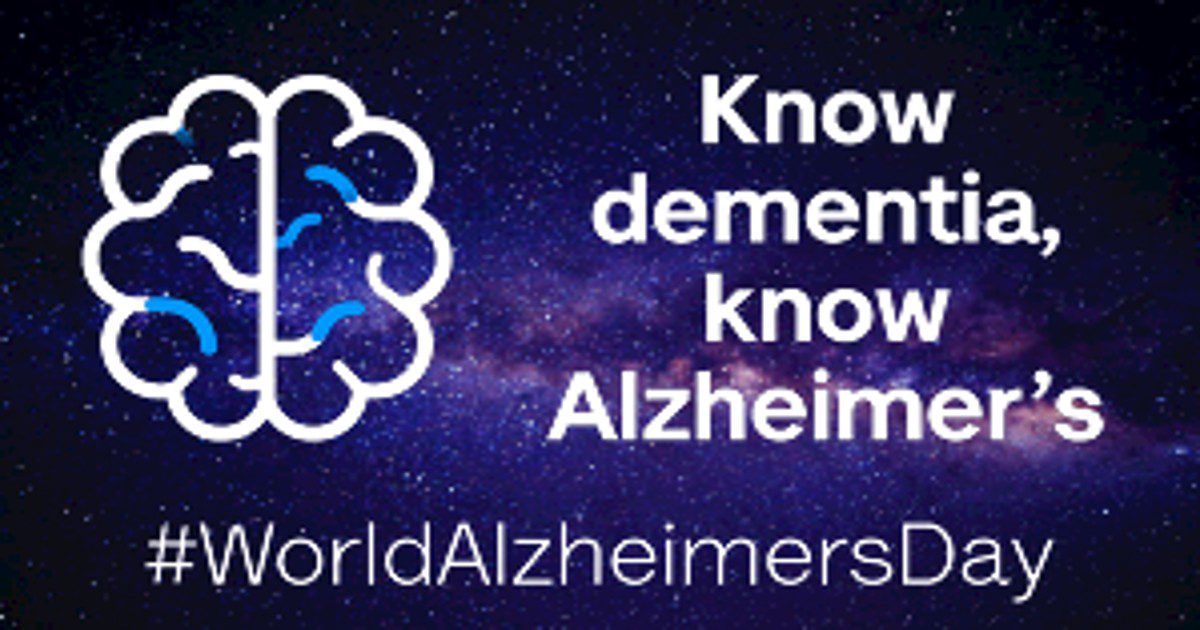World Alzheimer’s Day: is observed every year on the 21st of September. The objective of observing this day is to create awareness about the misconception of diseases named “DEMENTIA” and “Alzheimers” and to encourage and support the families of Alzheimer-affected patients to tackle and fight it.
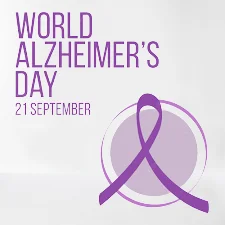
World Alzheimer’s Day
Alzheimer’s disease is among the most prevalent forms of dementia (a set of disorders that disrupt mental function. It is a severe brain disorder of memory loss and confusion, if not diagnosed and managed on time can adversely impact one’s mental abilities of learning, thinking, reasoning, remembering, problem-solving, decision-making, and attention, which could compromise one’s day-to-day life activities and control over emotions. This serious ailment doesn’t only impact the affected one, but also the family and person associated with him.
Every year complete September month is designated to “Alzheimers Month“, people across the world, various Alzheimers society and organization comes together in support of the people affected with Alzheimer and dementia.
The whole Alzheimers month is based on the quotation “Power of Knowledge” intending to spread the awareness and encouraging the affected families to participate in the activities organized during this month to acquire as much as knowledge about the disease and get support from the helping hands.
World Alzheimer’s Day was introduced on 21st September 1994 in Edinburgh, Scotland on the occasion of the 10th anniversary of Alzheimer’s Disease International (ADI). Alzheimers Disease International (ADI) is an organization founded in 1984 with an aim to support and guide the Alzheimers affected people and families.
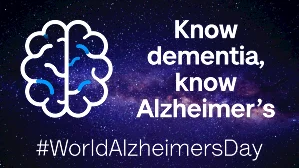
The organization also runs the Alzheimer University, which aims to connect people around the world to promote the Alzheimers month and helps Alzheimer associations throughout the globe in strategy making to fight with the Alzheimers and dementia. Alzheimers Disease International (ADI) has around 100 Alzheimer associations across world, that looks into the problem faced by the Alzheimers patients and families.
World Alzheimers Month is the international campaign from Alzheimers Disease International that takes place every September.
Each September, people unite from all corners of the world to raise awareness and to challenge the stigma that persists around Alzheimers disease and all types of dementia.
The first Alzheimers month campaign was launched in 2012. From previous studies, an average of 2 out of 3 people globally have little or no understanding of Alzheimer’s disease and associated dementia in their countries.
Dementia
Dementia is an umbrella term for several diseases affecting memory, other cognitive abilities and behavior that interfere significantly with a person’s ability to maintain their activities of daily living.
The illness gets worse over time. It mainly affects older people but not all people will get it as they age.
Things that increase the risk of developing dementia include:
- age (more common in those 65 or older)
- high blood pressure (hypertension)
- high blood sugar (diabetes)
- being overweight or obese
- smoking
- drinking too much alcohol
- being physically inactive
- being socially isolated
- depression.
Dementia is a syndrome that can be caused by a number of diseases which over time destroy nerve cells and damage the brain, typically leading to deterioration in cognitive function (i.e. the ability to process thought) beyond what might be expected from the usual consequences of biological ageing. While consciousness is not affected, the impairment in cognitive function is commonly accompanied, and occasionally preceded, by changes in mood, emotional control, behaviour, or motivation.
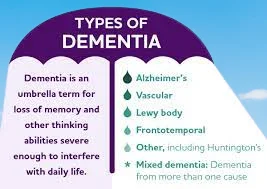
Dementia has physical, psychological, social and economic impacts, not only for people living with dementia, but also for their carers, families and society at large. There is often a lack of awareness and understanding of dementia, resulting in stigmatization and barriers to diagnosis and care.
Changes in mood and behaviour sometimes happen even before memory problems occur. Symptoms get worse over time. Eventually, most people with dementia will need others to help with daily activities.
Early signs and symptoms are:
- forgetting things or recent events
- losing or misplacing things
- getting lost when walking or driving
- being confused, even in familiar places
- losing track of time
- difficulties solving problems or making decisions
- problems following conversations or trouble finding words
- difficulties performing familiar tasks
- misjudging distances to objects visually.
Common changes in mood and behaviour include:
- feeling anxious, sad, or angry about memory loss
- personality changes
- inappropriate behaviour
- withdrawal from work or social activities
- being less interested in other people’s emotions.
Dementia is caused by many different diseases or injuries that directly and indirectly damage the brain. Alzheimers disease is the most common form and may contribute to 60–70% of cases. Other forms include vascular dementia, dementia with Lewy bodies (abnormal deposits of protein inside nerve cells), and a group of diseases that contribute to frontotemporal dementia (degeneration of the frontal lobe of the brain). Dementia may also develop after a stroke or in the context of certain infections such as HIV, as a result of harmful use of alcohol, repetitive physical injuries to the brain (known as chronic traumatic encephalopathy) or nutritional deficiencies.
There is no cure for dementia, but a lot can be done to support both people living with the illness and those who care for them.
People with dementia can take steps to maintain their quality of life and promote their well-being by:
- being physically active
- taking part in activities and social interactions that stimulate the brain and maintain daily function.
Alzheimer’s disease
Alois Alzheimer, a German psychiatrist, was the first to identify the disease while treating a German woman in 1901. The disease was named after him.
Alzheimer’s disease (AD) is a neurodegenerative disease that usually starts slowly and progressively worsens, and is the cause of 60–70% of cases of dementia. The most common early symptom is difficulty in remembering recent events. As the disease advances, symptoms can include problems with language, disorientation (including easily getting lost), mood swings, loss of motivation, self-neglect, and behavioral issues. As a person’s condition declines, they often withdraw from family and society. Gradually, bodily functions are lost, ultimately leading to death. Although the speed of progression can vary, the typical life expectancy following diagnosis is three to nine years.
As of 2020, there were approximately 50 million people worldwide with Alzheimers disease. It is ranked as the seventh leading cause of death in the United States.
There are no prevention measures and it has no cure, even the progression of the disease cannot be slowed.
The first ‘World Alzheimer Report’ was launched in 2009 on World Alzheimers Day and yearly reports have been issued every year since. Although the impact of the observance is spreading, the information gap and stigmatization concerning dementia remains an issue. Many people see the disease as a natural part of the aging process.
Getting checked by your healthcare provider can help determine if the symptoms you are experiencing are related to Alzheimer’s disease, or a more treatable conditions such as a vitamin deficiency or a side effect from medication. Early and accurate diagnosis also provides opportunities for you and your family to consider financial planning, develop advance directives, enroll in clinical trials, and anticipate care needs.
Medical management can improve quality of life for individuals living with Alzheimer’s disease and for their caregivers. There is currently no known cure for Alzheimer’s disease. Treatment addresses several areas:
- Helping people maintain brain health.
- Managing behavioral symptoms.
- Slowing or delaying symptoms of the disease.
Currently, many people living with Alzheimers disease are cared for at home by family members. Caregiving can have positive aspects for the caregiver as well as the person being cared for. It may bring personal fulfillment to the caregiver, such as satisfaction from helping a family member or friend, and lead to the development of new skills and improved family relationships.
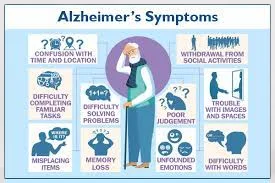
Although most people willingly provide care to their loved ones and friends, caring for a person with Alzheimer disease at home can be a difficult task and may become overwhelming at times. Each day brings new challenges as the caregiver copes with changing levels of ability and new patterns of behavior. As the disease gets worse, people living with Alzheimer disease often need more intensive care.
Some Facts about Alzheimer’s disease
In 2020, as many as 5.8 million Americans were living with Alzheimers disease.
Alzheimer is one of the most common type of Dementia, accounting for 60-80% of all dementia cases around the world.
Younger people may get Alzheimer disease, but it is less common.
The number of people living with the disease doubles every 5 years beyond age 65.
This number is projected to nearly triple to 14 million people by 2060.
It is estimated that the prevalence of Alzheimer worldwide is around 2.4 crores.
According to ADI, 13.5 crore people worldwide will be living with dementia by 2050.
Finland is the country with maximum no of Alzheimers in the world, with 55 cases of Alzheimers out of every 1 lakh people.
This is evident that majority of Alzheimer patients are 65 or older, but it’s not necessary that ageing the only risk factor of Alzheimers.
It has been observed that 5% of Alzheimer patients are hit by early-onset Alzheimers between the age of 40s and 50s.
Alzheimer doesn’t have any cure, and it is a progressive in nature, but early diagnosis and treatment can help in reducing the symptoms.
The first Alzheimers month campaign was launched in 2012. In a study, it has been noticed that an average of 2 out of 3 people globally have little understanding of Alzheimer disease and associated dementia in their countries.
Every year, Alzheimers Disease International (ADI), publishes its report on World Alzheimer Reports, focused on different topics related to Dementia.
Alzheimer is currently ranked as the seventh leading cause of death in the United States and is the most common cause of dementia among older adults.
Dementia is the loss of cognitive functioning — thinking, remembering, and reasoning — and behavioral abilities to such an extent that it interferes with a person’s daily life and activities. Dementia ranges in severity from the mildest stage, when it is just beginning to affect a person’s functioning, to the most severe stage, when the person must depend completely on others for help with basic activities of daily living.
In 1906, Dr. Alzheimer noticed changes in the brain tissue of a woman who had died of an unusual mental illness. Her symptoms included memory loss, language problems, and unpredictable behavior. After she died, he examined her brain and found many abnormal clumps (now called amyloid plaques) and tangled bundles of fibers (now called neurofibrillary, or tau, tangles).
These plaques and tangles in the brain are still considered some of the main features of Alzheimers. Another feature is the loss of connections between neurons in the brain. Neurons transmit messages between different parts of the brain, and from the brain to muscles and organs in the body.
Doctors use several methods and tools to help determine whether a person who is having memory problems has Alzheimer’s.
To diagnose Alzheimers Disease, doctors may:
Ask the person and a family member or friend questions about overall health, use of prescription and over-the-counter medicines, diet, past medical problems, ability to carry out daily activities, and changes in behavior and personality.
Conduct tests of memory, problem solving, attention, counting, and language.
Order blood, urine, and other standard medical tests to help identify other possible causes of the problem.
Administer tests to determine if depression or another mental health condition is causing or contributing to a person’s symptoms.
Collect cerebrospinal fluid via a spinal tap or order blood tests to measure the levels of proteins associated with Alzheimers and related dementias.
Perform brain scans, such as CT, MRI, or PET (positron emission tomography), to support an Alzheimers diagnosis or to rule out other possible causes for symptoms.
These tests may be repeated to give doctors information about how the person’s memory and other cognitive functions are changing over time.
People with memory and thinking concerns should talk to their doctor to find out whether their symptoms are due to Alzheimer’s or to another cause, such as stroke, tumor, Parkinson’s disease, sleep disturbances, side effects of medication, an infection, or another type of dementia. Some of these conditions may be treatable and, possibly, reversible.
For other health related articles, please click here to visit the website of read4knowledge.
